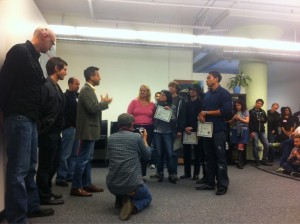One of the important lessons that you learn at Startup Weekend -- educational-focused or not -- is that you need to really focus your idea on a "minimum viable product." Clearly, in the case of a 54-hour event, you cannot tackle everything. That's the case outside of a Startup Weekend too, but the constraints of the time frame of the event make it clear. And so rather concocting than grandiose plans for fixing all the problems around student achievement or teacher training, for example, participants in Startup Weekend learn to reduce the scope to the most achievable but also really the most important ideas.
That doesn't mean that what we saw during the pitches Sunday night were watered down or ineffectual ideas. To the contrary: some of the most exciting apps were taking on some of the most important problems we face, including college student retention and teacher turnover and hiring.
Thirty-eight people pitched their ideas on Friday evening, and by the time Sunday evening rolled around, there were 14 start-ups ready to pitch their products, many with functioning websites and working demos. The startups ranged from sites that would help families plan educational outings, to apps that would help students with studying and memorization, to networks that would support teacher-to-teacher mentorship.
The first place winner of Startup Weekend Edu was Demo Lesson, a site where teachers can upload videos of themselves teaching in order to not just enhance their resume, but also to give schools a better idea of how applicants function in the classroom. Runners-up awards went to Code Wars, a coding competition site (which judges from Facebook and Google both said they'd use) and to ToGraduate, an app that would help support community college students, giving college case workers a better way to identify who was struggling and at risk of dropping out.
It's a great leap to take an idea that comes together over the course of a weekend with a group of complete strangers and turn that into a viable and influential startup. But it's happened before out of Startup Weekend. And as the Kauffman Foundation looks to have more events that are focused solely on the education space, hopefully it will happen more often.
In the meantime, about 100 people left the Grockit offices after a long and grueling but thrilling weekend, realizing that building an ed-tech startup -- despite all of the trepidation that some entrepreneurs have about the space -- is indeed doable.
And there were a handful of teachers that left the event, also exhausted, and ready to head back to the classroom, knowing that there is a strong developer and business community interested in helping solve some of their problems.


